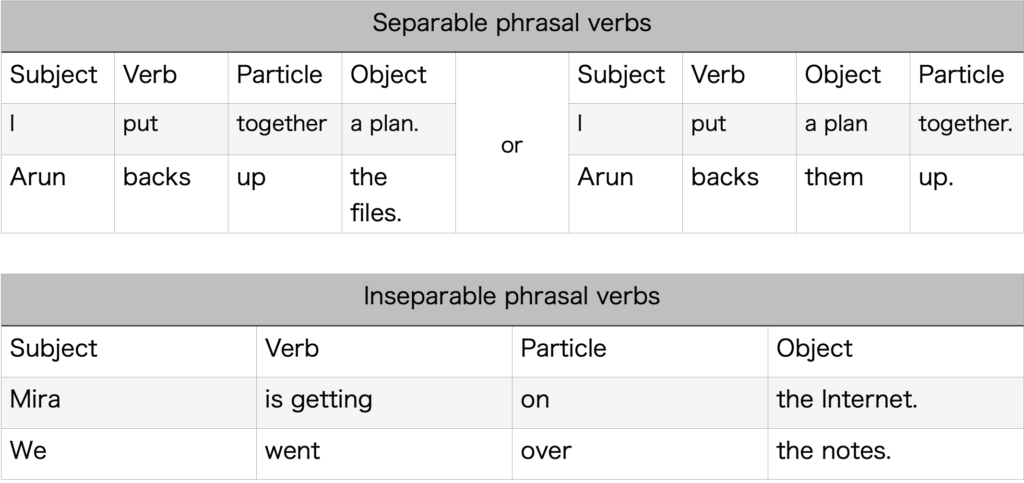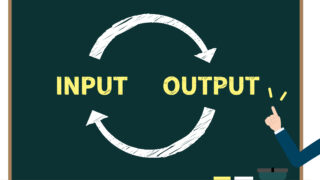こんにちは、こんばんは、おはようございます!
元不登校中学校卒業時英語の成績2だった英語の先生Kazumaです。
今日は、【留学先生日記】#20 イディオム 熟語 句動詞 Phrasal verbs with objectsについて説明します。
中学生、高校生で習う表現です。
イディオム熟語なので一つひとつお覚えないと行けません。
めちゃくちゃ日常生活で使いますが、私は語彙を増やすのが、苦手ですwww
会話、読解様々な場面で使います。
そんな引きこもりの元もども部屋お兄さんが何となく説明していくので最後まで読んでいただけると嬉しいです。
私は、日本語が母国語で現在カナダのバンクーバーで語学留学をしています。
大学生の頃、ブルガリアに2ヶ月間いたので、少しだけブルガリア語ができます。
最近、身近な人の母国語がタガログ語、マンダリン、ポルトガル語だったりするのでブルガリア語のように緩く勉強はじめました。
そんな私が異なる言語を使う際に”今話している単語の品詞は名詞でその後に動詞を過去形にして”とか考えたことがありません。
だから私は単語、表現、文法をイメージで覚えます。
みなさん母国語ってそうやって習得しています。新しい言語を勉強して習得するにあたって、単語や文章のイメージができることがとても大切です。
かんたんに説明をすると、”英語を英語で学び、英語で理解すること”です。
Vocabulary
check in with: to talk with someone to make sure that everything is okay
run out of: to use all of something so that there is none left
get on: to connect to an online network to use a cell phone or computer
go over: to review something
go through: to look at or read something carefully
back up: to make a copy of information on a computer
put together: to prepare or produce something by collecting information, ideas, etc.
figure out: to understand someone or something after thinking about him, her, or it
Vocabulary Practice
Write the phrasal verbs from “Vocabulary” next to the correct word or phrase. More than one answer may be possible.
1. ( ) your computer
2. ( ) a problem
3. ( ) your files
4. ( ) your family
5. ( ) the information
6. ( ) paper
A.1. get on, back up, figure out 2. figure out
3. go over, back up, go through, put together 4. check in with, figure out
5. back up, go over, put together, go through 6. run out of,
イディオム 熟語 句動詞 Phrasal verbs with objects
Phrasal verbs are made up of a verb + particle.
Particles look like prepositions (with, of, on), but together with the verb they have a different meaning.

Notes
• With separable phrasal verbs, the object can come before or after the particle.
• When the object is a pronoun, it must come after the verb and before the particle.
Compare these examples:
I put a plan together. = I put it together.
I put together a plan. ≠ I put together it.
• With inseparable phrasal verbs, the object always comes after the particle.
We went over the notes. We went over them.
I put a plan together. = I put it together.
I put together a plan. ≠ I put together it.
(代名詞をイディオム熟語の後に置くことはできない)
(代名詞の位置は必ずputとitの間になる)
今回説明したもので最も注意しなければならないことは、代名詞の位置です。
イディオム熟語は、たくさんあるので覚えるしかありません。
代名詞の位置のルールさえ、理解できればかんたんに覚えることができます。
例外もあるので、一つひとつ覚えなければなりませんが、ほとんどがこのパターンに当てはまります。
Practice
Put the words in the correct order to make sentences. If the phrasal verbs are separable, write the sentence in two ways.
1. with / will/ my manager / I / check / in
( )
2. run / have / paper / of / we / out
( )
3. I/ can / up / set / the projector
( )
4. the feedback / go / let’s / tomorrow / over
( )
5. get / need to / the internet / on / I
( )
6. out / hasn’t / it / Pedro / figured / yet
( )
7. a plan / put / Fatima / for the party / together
( )
8. the process / Dana / went / carefully / through
( )
Read each conversation. Complete the sentences using the phrasal verb and a pronoun as the object.
9. A: Did you back up your hard drive?
B: Yes I ( ) an hour ago.
10. A: Are you going to check in with Sara?
B: Yes, I will ( ) this afternoon.
11. A: Did we run out of printer ink?
B: Yes, we ( ) yesterday.
12. A: Do you want to go over the notes together?
B: Sure, but let’s ( ) later.
13. A: Have you figured out the problem?
B: No, I haven’t ( ) yet.
14. A: Did you put together the agenda for the meeting?
B: Yes, I ( ) this morning.
15. A: Would you mind setting up the tables and chairs for the presentation?
B: Sure. I’ll ( ) now.
16. A: Should we go through the client feedback now?
B: Sure. Let’s ( ) in my office.
17. A: Did he remember to turn on the computer?
B: Yes. he ( ) already.
A.1. I will check in with my manager. 2. We have run out of paper.
3. I can set up the project. I can set the project up.
4. go over the feedback tomorrow. 5. I need to get on the internet.
6. Pedro has’t figure it out.
7. Fatima put together a plan for a party. Fatima put a plan together for a party.
8. Dana went through the process carefully.
9. backed it up 10. check in with her 11. run out of it
12. go over them 13. figured it out 14. put it together
15. set them up 16. go through it 17. turned it on
まとめ
イディオム 熟語 句動詞 Phrasal verbs with objectsでした。
中学生、高校生で習うものですが、代名詞の位置に注意すればかんたんに攻略できます。
一つひとつ覚えるしかないので、とにかく机で戦う時間を増やしてください。
たいした説明ができないポンコツが、ムダを省いてかんたんにまとめてみました。


















